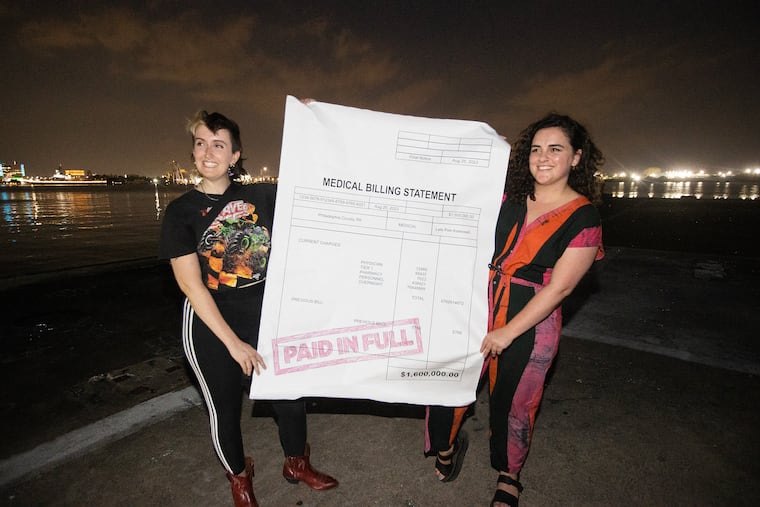The final count is in. These ‘dirtbag’ Philadelphians erased more than $2M in local medical debt.
A group of self-described mostly queer, gutter-pagan South Philadelphia dirtbags erased more than $2 million in local medical debt this summer.

A group of self-described mostly queer, gutter-pagan South Philadelphia dirtbags — they’re not quite sure how else to describe their punk-rock attitudes and do-good values — set out to erase a modest $1 million in local medical debt this summer.
Their final tally exceeded $2 million, according to the nonprofit RIP Medical Debt, which helped with the logistics of the purchase. The group not only raised enough money to buy all of Philadelphia’s medical debt available on the secondary market, they were able to buy some debt from Bucks and Delaware Counties — no strings attached.
Here is the breakdown by county:
$1,765,033.84 of debt for 1,935 families in Philadelphia
$163,632.70 of debt for 119 families in Delaware County
$91,083.70 of debt for 160 families in Bucks County
Families who had their debt forgiven are to receive envelopes with the news in the coming weeks.
“This rocks; we’re very excited,” said South Philly union organizer Claire Hirschberg, who led the campaign with her friend Lou Garner, a nurse. “It’s so crazy to see that it’s so much more money than was originally estimated.”
When hospitals or physician groups have outstanding bills they have little chance of collecting from patients, they will go to a secondary market and sell their portfolios of debt for pennies on the dollar. Debt collectors can then step in, buy the portfolios, and resume the task of hounding patients for payments.
RIP Medical Debt, founded by two former debt collectors in 2014, is in the secondary market with a completely different goal after purchase: to forgive that debt.
Think of the nonprofit as a middleman for do-gooders such as Hirschberg and Garner. The two friends committed to raising $10,000 and RIP Medical Debt found all the debt in Philly, Delco, and Bucks County available for purchase. The nonprofit also found eligible families. To qualify, people need to earn less than four times the federal poverty level, which varies by family size, or have debts that are 5% or more of annual income.
Hirschberg and Garner said they were inspired by churches that had worked to buy and forgive debt. Garner is also a nurse in neurology who’s seen firsthand just how crippling the sudden onslaught of medical bills can be to patients struggling with life-threatening diagnoses. The pair figured they could raise at least $10,000 with the help of their other South Philly friends. They raised more than $17,000 by the end of August.
Although they couldn’t solve the systemic problem of crushing medical debt experienced by families, they could help make some of it disappear.
“It does show how fake debt is in some ways,” Hirschberg said of how cheaply they could buy millions in debt for so little.
The pair’s efforts went viral on social media after The Inquirer wrote about their ceremonial debt-burning dance party at the pier behind the South Philly Walmart.
Hirschberg said the response to the campaign has been overwhelming.
“My grandma knew that we’ve gone viral, so that was cool,” she said.
Even cooler? An RIP Medical Debt spokesperson reported an uptick in people asking how they could run similar campaigns after the story was published, which had been one of the goals that Hirschberg and Garner had for the campaign.
Garner said a friend in Portland, Maine, hosted a first meeting this week to launch a similar debt forgiveness effort. Garner said it’s not “easy, easy” but certainly easier because RIP Medical Debt handles the logistics of setting up a landing page on its website.
“Literally all you have to do is shake people down for the money,” joked Garner. “You don’t need to be a formal organization to do this. It can just be you and your dirtbag friends.”